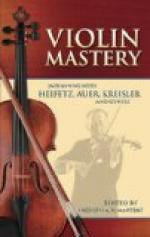“Do I play at all while in Service? I gave up all playing in public when entering the Army a year ago, and to a great extent all private playing as well. I have on one or two occasions played at charity concerts during the past year, once in Rome, and once in the little town in Italy near the aviation camp at which I was stationed at the time. I have purposely refused all other requests to play because one cannot do two things at once, and do them properly. My time now belongs to my country: When we have peace again I shall hope once more to devote it to Art.”
XXII
THEODORE SPIERING
THE APPLICATION OF
BOW EXERCISES TO
THE STUDY OF KREUTZER
A. Walter Kramer has said: “Mr. Spiering knows how serious a study can be made of the violin, because he has made it. He has investigated the ‘how’ and ‘why’ of every detail, and what he has to say about the violin is the utterance of a big musician, one who has mastered the instrument.” And Theodore Spiering, solo artist and conductor, as a teacher has that wider horizon which has justified the statement made that “he is animated by the thoughts and ideals which stimulate a Godowsky or Busoni.” Such being the case, it was with unmixed satisfaction that the writer found Mr. Spiering willing to give him the benefit of some of those constructive ideas of his as regards violin study which have established his reputation so prominently in that field.
TWO TYPES OF STUDENTS
“There are certain underlying principles which govern every detail of the violinist’s Art,” said Mr. Spiering, “and unless the violinist fully appreciates their significance, and has the intelligence and patience to apply them in everything he does, he will never achieve that absolute command over his instrument which mastery implies.
“It is a peculiar fact that a large percentage of students—probably believing that they can reach their goal by a short cut—resent the mental effort required to master these principles, the passive resistance, evident in their work, preventing them from deriving true benefit from their studies. They form that large class which learns merely by imitation, and invariably retrograde the moment they are no longer under the teacher’s supervision.
“The smaller group, with an analytical bent of mind, largely subject themselves to the needed mental drill and thus provide for themselves that inestimable basic quality that makes them independent and capable of developing their talent to its full fruition.
[Illustration: THEODORE SPIERING, with hand-written note]
MENTAL AND PHYSICAL PROCESSES COOeRDINATED




